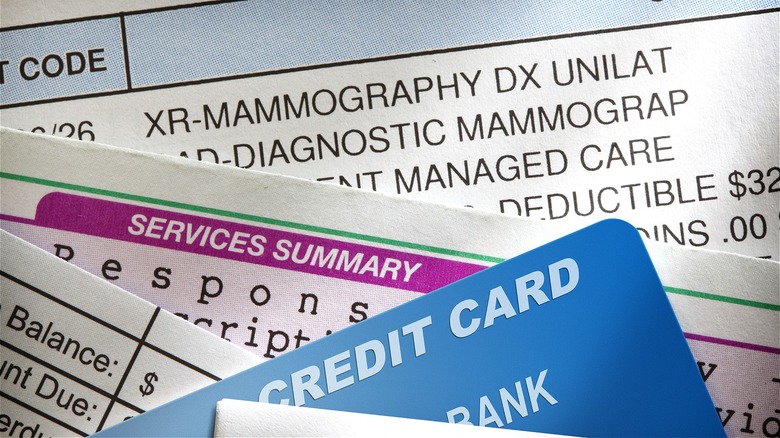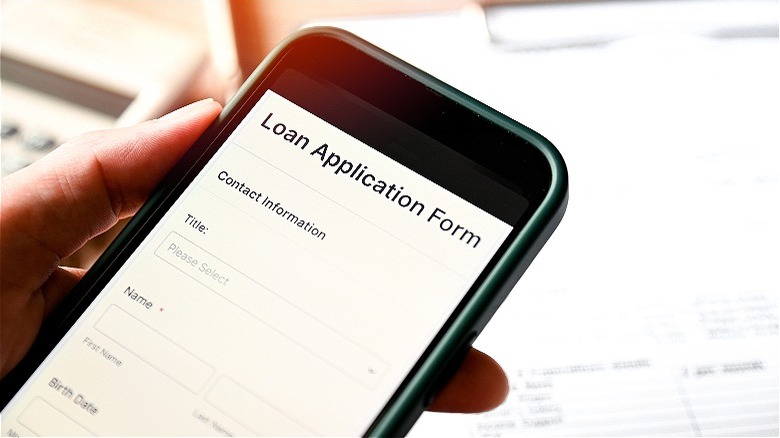You Should Think Twice Before Paying Medical Bills With A Credit Card
Medical bills are on the rise for many Americans. According to the Peter G. Peterson Foundation, people in the U.S. experience some of the highest costs of healthcare in the entire world. In 2022, healthcare spending hit $4.5 trillion (which averages to about $13,493 in spending per person), and according to government data and KFF, a medical policy nonprofit, people in the U.S. owe at least $220 billion in medical debt. According to the data, 14 million people (or 6% of adults) owe over $1,000, and about 3 million people (or 1% of adults) owe more than $10,000. In the face of rising debt, it can be increasingly difficult to tell the difference between good and bad debt.
When combined with inflation, housing prices, and wages that aren't keeping up, it's no wonder more and more people are relying on credit cards to try and offset expenses. However, this over-reliance on credit cards is leading to other problems. Credit card debt is now reaching record heights across the country. As of the first quarter of 2024, U.S. credit card debt was $1.12 trillion and in 2023, the average monthly credit card balance was $6,501. This leaves people trying to juggle their current expenses with past bills, which increases the likelihood they'll deal with additional fees and interest payments which can make repayment take even longer and cost even more. While it can be temping to throw large expenses on a credit card, let's dive into why you should think twice.
Downsides of using a credit card for medical bills
As previously mentioned, fees and interest can be huge downsides when using a credit card for medical bills. The annual percentage rates (APRs) attached to credit card debt are typically substantially higher than other types of financing or loan options available. The current average credit card rate in the U.S. is 27.65%, however, those with different kinds of cards (for instance, rewards or cash-back credit cards) can have a significantly higher APR rate than others. There are several red flags to look out for when choosing a credit card, and a high APR is one. These high interest rates can ensure that paying back your loans takes even longer due to how much you will have to pay in interest.
Another important way that medical bills can negatively affect you when placed on a credit card centers on your credit utilization. Essentially, the more of your available credit that you've used/spent, the higher your credit utilization ratio is. A good example would be if you placed a $4,000 medical bill on a credit card with a $5,000 limit. This would make your credit utilization for that month 80%. Lenders typically prefer to see utilization rates that fall below 30%, so carrying large medical bills on a credit card could quickly push your utilization up, which can negatively impact your credit score. It's also worth mentioning that consistently high utilization can damage your score, even if you make your payments on time.
Other things to keep in mind
It's important to remember that carrying a credit card balance does not help your credit score, and can actually make it worse. If you know you will be unable to pay your medical bills in the same statement period, it might be worth avoiding using your credit card for those expenses. If you already have medical expenses on a credit card and are struggling to pay them back, remember that paying the minimum statement amount every month is still better than nothing at all. On the flip side, if you know you will able to pay off those expenses without incurring additional interest or fees, it could be worth taking advantage of the perks, especially if you have a rewards or cash-back-based credit card.
It's also important to realize that your credit card might not be the only option available to you. Depending on your medical provider, you might be able to negotiate a no or low-interest payment plan for your medical bills. Another potential option is to look into a personal loan. These loans typically have lower interest rates than credit cards meaning you won't end up having to pay as much in interest throughout your repayment timeline. Plus, since personal loans count as installment accounts as opposed to revolving accounts like credit cards, the balance on your loan won't impact your credit utilization ratio. This means your credit score won't take a hit just because of your credit card balance every month.


